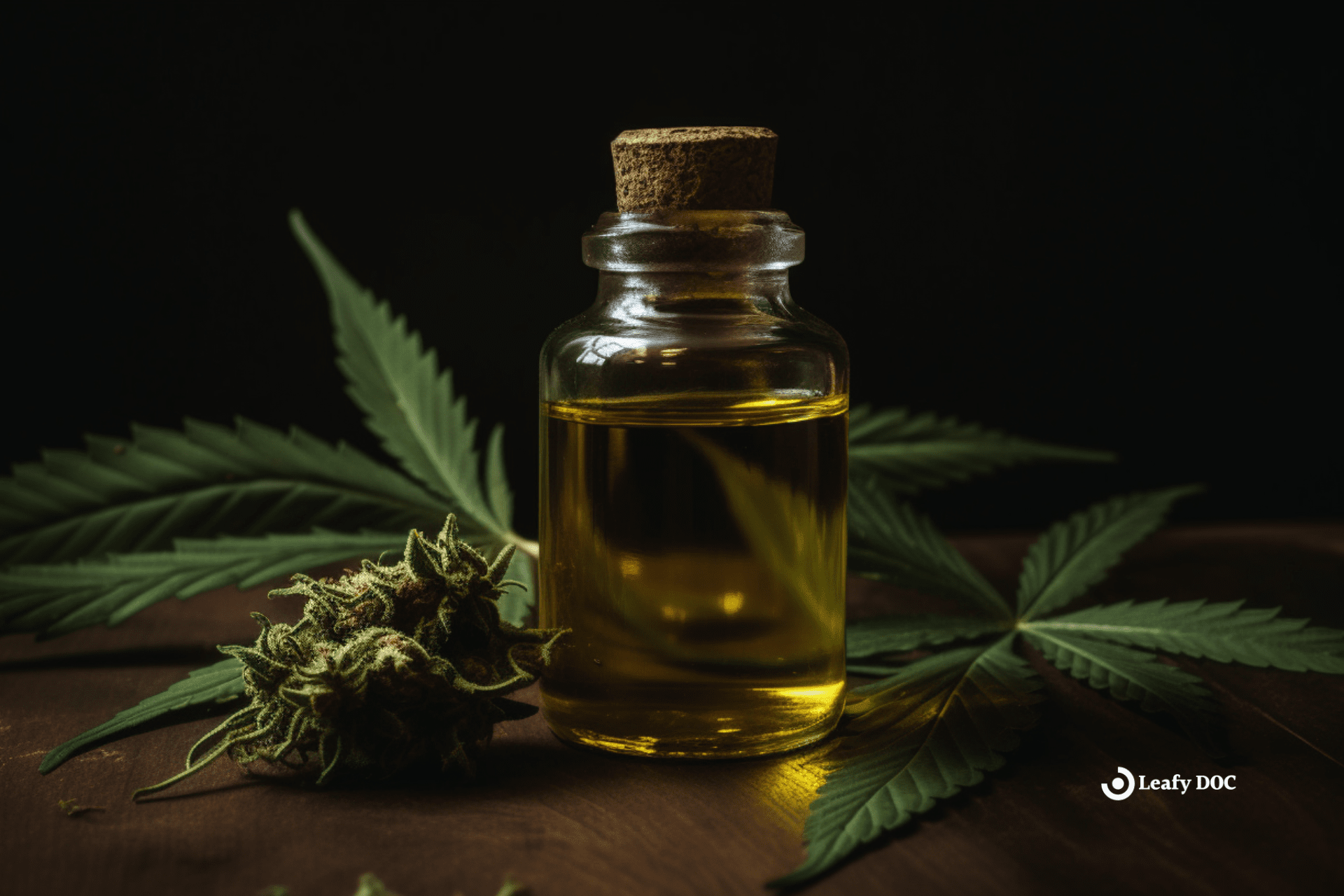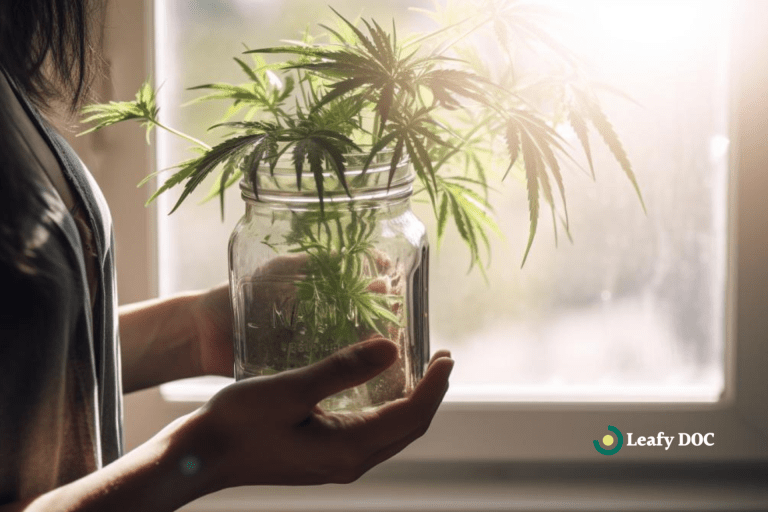The Best Method For Making CBD Oil
by Haley Mills · October 4, 2023
Unlock the Secrets of Crafting Top-Quality CBD Oil – Click Now!

CBD oil has gained immense popularity recently for its potential health benefits. CBD oil has been touted as a natural remedy, whether you’re looking to alleviate chronic pain, reduce anxiety, or improve sleep.
While numerous CBD oil products are available on the market, making your own CBD oil can be rewarding and cost-effective. Understanding the best method for making CBD oil will ensure its quality and potency.
To start, it’s crucial to have a solid understanding of the extraction process. CBD can be extracted from the hemp plant using various methods, including CO2 extraction, ethanol extraction, or oil infusion. Each method has its own advantages and disadvantages, and the choice of extraction method can significantly affect the quality of the final product.
Selecting a suitable hemp strain is essential. Different strains of hemp contain varying levels of cannabinoids, including CBD. Choosing a high CBD and low THC content strain is crucial for producing CBD oil with potent therapeutic effects. By understanding the extraction process and selecting the appropriate hemp strain, you can ensure that your homemade CBD oil is of the highest quality.
Understanding the Extraction Process
Now that we understand the different CBD extraction methods let’s dive into the best method for making CBD oil.
One popular method is solvent-based extraction, which involves dissolving the cannabinoids and other compounds found in the hemp plant. The most commonly used solvents for CBD extraction include ethanol, butane, and propane. These solvents can separate the cannabinoids from the plant material, allowing pure CBD oil extraction.
However, there are some drawbacks to solvent-based extraction. One primary concern is the potential for residual solvents to remain in the final CBD oil product. This can be harmful if consumed, as these solvents can be toxic. The solvent-based extraction can also strip away some of the beneficial compounds found in the hemp plant, resulting in a less potent CBD oil.
Another method that is often considered the best for making CBD oil is CO2 extraction. This method involves using carbon dioxide under high pressure and low temperatures to extract the cannabinoids and other compounds from the hemp plant. CO2 extraction is considered to be the most efficient and safe method of extraction, as it does not require the use of any harmful solvents.
The CO2 extraction process also allows for more control over the extraction process, as different temperatures and pressures can be used to extract specific compounds. This means that CBD oil produced through CO2 extraction can be more potent and contain a higher concentration of cannabinoids compared to other extraction methods.
In conclusion, while solvent-based extraction may be a popular method for making CBD oil, it does come with some drawbacks. CO2 extraction, on the other hand, is considered the best method for making CBD oil due to its efficiency, safety, and ability to produce a high-quality and potent product.
Choosing the Right Hemp Strain
When selecting the appropriate hemp strain, it’s essential to consider various factors. One important factor is evaluating cannabinoid profiles. Cannabinoids are the chemical compounds in hemp that interact with our body’s endocannabinoid system. The most well-known cannabinoid is THC, which is responsible for the psychoactive effects of cannabis.
However, CBD is another cannabinoid that has gained significant attention for its potential health benefits. When choosing a hemp strain for CBD oil production, selecting a strain with a high CBD content and low THC content is crucial. This ensures that the resulting oil will have the desired therapeutic properties without causing any psychoactive effects.
In addition to evaluating cannabinoid profiles, analyzing terpene profiles is another crucial aspect when selecting the right hemp strain. Terpenes are aromatic compounds in hemp that contribute to its unique smell and taste. They also have potential therapeutic benefits. Different terpenes have different effects, and some may enhance the effects of CBD.
For example, the terpene called myrcene is known for its relaxing and sedative properties, while limonene has been found to have mood-enhancing effects. By analyzing the terpene profiles of different hemp strains, you can choose a strain that not only has a high CBD content but also contains terpenes that complement the desired therapeutic effects of CBD oil.
Decarboxylation and Activation of Cannabinoids
To enhance the potency and effectiveness of your CBD oil, you’ll want to start by decarboxylating and activating the cannabinoids.
Decarboxylation is a process that involves heating the hemp flower or plant material to a specific temperature to convert inactive cannabinoids, such as CBDA, into their active forms, such as CBD. This step is crucial because the cannabinoids in their inactive forms have limited therapeutic effects. By decarboxylating the cannabinoids, you’re unlocking their full potential and maximizing the benefits of your CBD oil.
In addition to decarboxylation, activating cannabinoids involves incorporating terpenes into CBD oil production.
Terpenes are aromatic compounds found in the hemp plant that not only contribute to the unique flavors and scents of different strains but also play a significant role in the overall therapeutic effects of CBD oil. Terpenes work synergistically with cannabinoids to enhance their effects, a phenomenon known as the entourage effect. You can create a more well-rounded and effective product by preserving and incorporating terpenes into your CBD oil.
Integrating CBD oil into daily wellness routines is becoming increasingly popular as more people recognize its potential benefits.
CBD oil can be used as a natural supplement to support overall well-being and promote a sense of balance and relaxation. Many people incorporate CBD oil into their daily routines by adding it to their morning coffee or tea, using it as a topical for skincare, or taking it before bed to help with sleep.
Selecting the Appropriate Carrier Oil
Choosing the appropriate carrier oil is crucial in producing high-quality CBD oil. The carrier oil is responsible for diluting the CBD extract and ensuring its proper absorption in the body. When selecting the right carrier oil, it’s important to consider factors such as bioavailability, stability, and overall quality.
One of the key considerations when choosing the right carrier oil is its bioavailability. Bioavailability refers to the percentage of CBD absorbed and utilized by the body. Some carrier oils have higher bioavailability than others, allowing for better absorption of CBD. For example, MCT (medium-chain triglyceride) oil is known for its high bioavailability, making it an excellent choice for CBD oil production.
Another option is hemp seed oil, which has good bioavailability and is rich in omega-3 and omega-6 fatty acids, providing additional health benefits.
In addition to bioavailability, stability is another factor to consider when selecting a carrier oil. CBD oil should be shelf-stable and withstand various environmental conditions without degradation. Some carrier oils, such as olive or coconut, have a longer shelf life and are less likely to go rancid.
Be sure to choose a carrier oil compatible with CBD that doesn’t alter its chemical composition or potency.
Determining the optimal CBD concentration is another crucial aspect of selecting the right carrier oil. The concentration of CBD in the final product will depend on the desired potency and intended use. Different carrier oils have different capacities for holding CBD, so choosing a carrier oil that allows for accurate and consistent dosing is essential.
Additionally, certain carrier oils may have a more robust flavor profile that can affect the overall taste of the CBD oil, so consider the desired flavor when making a decision.
Storing and Preserving the Quality of CBD Oil
Proper storage and preservation are crucial in maintaining the quality of CBD oil. CBD oil is susceptible to light, heat, and air, which can degrade its potency and effectiveness over time. Temperature control is crucial in preserving the quality of CBD oil. It is recommended to store CBD oil in a cool, dark place, away from direct sunlight and heat sources. Extreme temperatures can cause the oil to break down and lose its therapeutic properties. To illustrate the impact of temperature on CBD oil, consider the following table:
| Temperature | Effects on CBD Oil |
|---|---|
| Below 70°F | Optimal storage |
| 70-80°F | Some degradation |
| Above 80°F | Significant degradation |
As shown in the table, temperatures above 80°F can lead to significant degradation of CBD oil. Therefore, it is essential to store CBD oil in a cool environment to ensure its longevity and potency.
Various filtration methods play a vital role in preserving the quality of CBD oil. Filtration removes impurities and unwanted compounds from the oil, resulting in a purer and more potent final product. Various filtration techniques are used in the CBD oil production process, including carbon filtration, winterization, and distillation. Each method has its advantages and is chosen based on the specific needs and goals of the manufacturer. These filtration methods help remove undesirable compounds, such as chlorophyll and waxes, which can affect the taste and quality of CBD oil. By employing effective filtration techniques, manufacturers can ensure that their CBD oil maintains its purity and potency, providing users with a high-quality product.
Frequently Asked Questions
Are there any potential side effects of CBD oil?
CBD oil has slight potential long-term effects, such as liver damage and drug interactions, but it is known to be relatively harmless. Research suggests CBD oil may effectively relieve chronic pain, offering a natural alternative to traditional pain medications.
How long does it take for CBD oil to start working?
Factors affecting the onset time of CBD oil effects include the method of consumption. Inhalation and sublingual administration tend to have quicker onset times than oral ingestion. However, individual factors such as metabolism can also influence the time it takes for CBD oil to start working.
Can CBD oil be used for pets?
CBD oil can be used for pets, but it’s important to consider dosage and administration. The effectiveness of CBD oil in treating common pet ailments such as anxiety, pain, and inflammation has been well-documented.
Is CBD oil legal in all states?
CBD oil is legal in all 50 states as long as it is derived from hemp and contains less than 0.3% THC. When comparing CBD oil to medical marijuana, it is often considered more effective for chronic pain relief due to its anti-inflammatory properties.
Can CBD oil interact with other medications?
Potential drug interactions with CBD oil should be taken seriously. Consult with a healthcare professional before using CBD oil with any medications. Precautions should be taken to ensure safe and effective use.
Last Updated: August 8, 2024
Get Approved for Your Medical Marijuana Card in Minutes!

Get Your Medical Card
Connect with a licensed physician online in minutes

Like This Article?
Share with your friends
Table of Contents
Keep Reading
-
4 Steps to Obtain Your Medical Marijuana Card Georgia Online
Obtain your medical marijuana card in Georgia online with these simple steps and guidelines.
-
Managing Parkinson’s Disease With Medical Marijuana
Find out how medical marijuana is transforming the lives of Parkinson’s disease patients. Learn about the incredible benefits and relief it offers. Click here to discover a natural solution for managing Parkinson’s with cannabis today!
-
Navigating The Laws For Obtaining A Medical Marijuana Card
Unlock the benefits of medical marijuana legally with our ultimate guide to navigating the laws for obtaining a medical marijuana card. Don’t miss out on the hassle-free process – get your card now!



